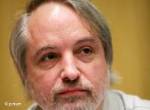• Topics / Victims of political repression
• Topics / News from the CIS countries
Historians fear Moscow wants to control all post-Soviet archives

Nikita Petrov
Historians are concerned at news of an agreement which binds post-Soviet countries to agree policy on declassifying Soviet archives, and fear that some material could be classified again.
Up till now each former Soviet republic could determine how much truth its citizens needed to know about the Soviet past. In some places there was greater openness, some less.
This could now all change and without the agreement of CIS partners, it will not be possible to declassify Soviet archives. This follows from an Agreement on Procedure for Reviewing the Level of Secrecy of Information classified in Soviet times. The document was signed in October at a CIS Summit in St. Petersburg.
The step is supposedly to “ensure national security of each of the CIS member states” and to standardize approaches, however the text of the agreement has not been made public and officials refuse to comment.
Russian historian and Deputy Head of the Memorial Society, Nikita Petrov sees the agreement as reflecting “Moscow’s wish to impose its approach to Soviet archives on other CIS countries”. He told Deutsche Welle that a “single approach” in this case means a Russian approach.
“Russian rules are not in favour of researchers. There are more and more restrictions, less and less documents are being issued from the archives”.
He says that a huge number of documents, even from the 1920s are still kept from the public. This is illegal since Russian legislation has a maximum period of 30 years for keeping documents classified, with this period longer for intelligence service documents – 50 years. Russia is showing contempt for its own legislation, he says, and foisting this on other post-Soviet republics.
Nikita Petrov has even reached the Russian Supreme Court in his attempts to get access to documents concerning NKVD repression. All his efforts have been fruitless, regardless of what the law says.
He points out that under such conditions, access to Soviet archives in Kazakhstan or Ukraine was enormously important. However the most important archival documents are held in Moscow, and researchers are not given access.
Mr Petrov believes that this “standard approach” became especially important for Moscow when President Yushchenko began the campaign over remembering the victims of Holodomor [the manmade Famine of 1932-1933).
At present the Agreement has been endorsed by Russia, Belarus, Armenia, Tajikistan and Uzbekistan. Nikita Petrov warns that if Ukraine signs it, it will have to close access even to material previously declassified, for example, about Holodomor.
Neither Deutsche Welle, nor Ukrainian historians and human rights workers have been able to get an answer from Ukraine’s government as to whether it plans to sign.
According to former Head of the Security Service Archives and historian Volodymyr Vyatrovych, a change in Ukraine’s policy is already evident. He says that after Yanukovych’s election, work on systematic publication of documents on crimes of the Soviet regime was effectively wound up.
The danger is great that if this agreement is signed, only the archives of the Baltic States will remain open to researchers. Nikita Petrov calls on Ukrainian historians and human rights workers to make every effort to prevent this. He says that a lot of noise needs to be made, creating an atmosphere in which Ukraine’s government will not sign.
From a report on the Deutsche Welle Ukrainian Service





